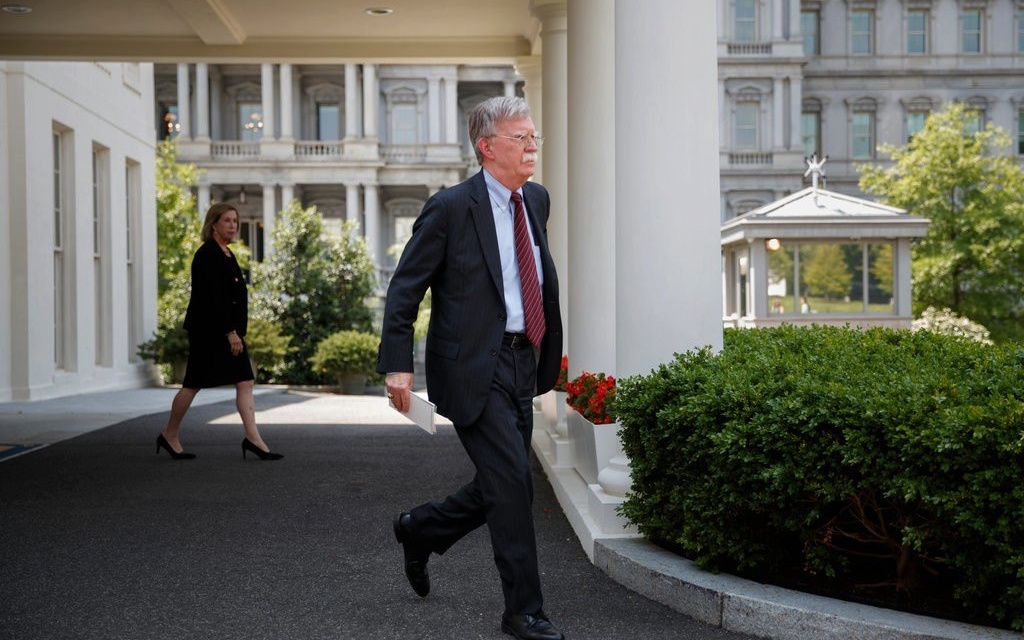National Security Advisor John Bolton, a hardline proponent of regime change in Iran
The Trump Administration has split over how far to press its regime change operations against Iran.
The division has come out in rival comments to outlets such as The New York Times.
“Three administration officials” are pushing claimed intelligence behind recent the recent US move of air and naval forces to the Persian Gulf and this week’s order for the partial evacuation of the US Embassy in Iraq.
But a “senior administration official” has queried the intelligence, as have US allies. Britain’s military commander in the region said he did not see an escalation of the threat from Iran or Iran-backed militias in Iraq and Syria, and other European partners, Iraqi officials, and some American legislators have expressed concern.
The three officials backing the warnings said US had photographed missiles on small boats in the Persian Gulf, loaded by Iranian paramilitary forces. They claimed that satellite imagery showed the fully-assembled missiles, with the prospect of attacks on US Navy ships. Additional intelligence indicated threats against commercial shipping and potential attacks by Iran-backed militias on US troops in Iraq.
The claims support the hardline National Security Advisor John Bolton, who announced on May 5 the move of a carrier strike group — led by the USS Abraham Lincoln and including bombers — to the Gulf. More bombers have been stationed in Qatar.
Meanwhile, the US has expanded sanctions through the designation of the Revolutionary Guards as a “foreign terrorist organization” and the end to sanction waivers for Iran’s leading oil customers.
But multiple officials, including of allied intelligence services, have questioned Bolton’s case. Those criticisms were buttressed on Wednesday: the dissenting senior administration official said Pompeo was over-reacting with the Baghdad evacuation order, and Iraqi representatives said the threat level was not urgent.
Perhaps the most damning indictment came from Maj. Gen. Chris Ghika, the British deputy commander of the US-led coalition for operations against the Islamic State. Speaking from Baghdad on Tuesday, he responded to a question about the US warnings, “We’ve seen no change in the posture” of Iranian-supported militia “since the recent exchange between the United States and Iran”.
Ghika continued that “many” of the militias “are compliant”. Asked about Bolton-led statements that coalition troops are threatened, he responded, “Am I concerned about the danger? No, not really.”
US Central Command spokesman Capt. Bill Urban rebuked Ghika, “Recent comments from OIR [Operation Inherent Resolve] Deputy Commander run counter to the identified credible threats available to intelligence from US and allies regarding Iranian-backed forces in the region.”
“Angry, Frustrated” Trump
But a senior administration official, speaking to The Washington Post, knocked back the Bolton camp with the claim that Donald Trump is angry and frustrated with hardliners for going beyond his thoughts.
“They are getting way out ahead of themselves, and Trump is annoyed. There was a scramble for Bolton and Pompeo and others to get on the same page.”
It is unknown if the senior official is the same source in The New York Times or a second dissenter.
The official said that Bolton is “just in a different place” from Trump, who “wants to talk to the Iranians. He wants a deal.”
He maintained that Trump “is not comfortable with all this ‘regime change’ talk” because it resonated of the removal of President Saddam Hussein in the 2003 Iraq War.
Another “senior White House official” took a middle line between the two camps within the Administration, saying Trump is not inclined to respond forcefully unless there is a “big move” from the Iranians but is willing to act if there are US deaths or a dramatic escalation.
US intelligence officials will brief Congressional leaders on Thursday about the new information backing the claim of an Iranian threat.
In a closed-door gathering of House Democrats, Speaker Nancy Pelosi criticized the Administration’s lack of and insisted on consultation of Congress before any action.
Senate Majority Leader Chuck Schumer cited reports on Pentagon plans for sending as many as 120,000 troops to the Middle East.
Did we learn the lessons of the last decade? There is an alarming lack of clarity here, there’s a lack of strategy, and there’s a lack of consultation. The President ought to come up with a strategy and make it clear to Congress.
But Republican Senator Marco Rubio backed the Trump hardliners:
I’ve been here eight years. This is, by far, the single most imminent potential conflict of this significance that I have been around.
“This is real. This is not a fake thing. It’s not being made up by somebody. This President does not even want to have troops in the Middle East.
M

